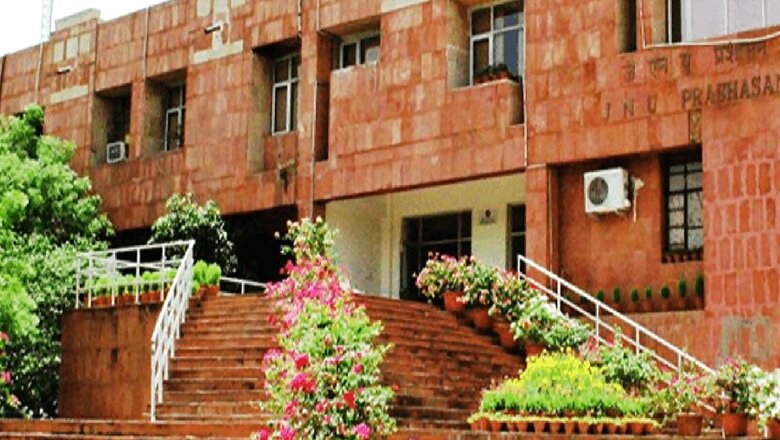
views
The Jawaharlal Nehru University on Thursday withdrew the rules that stipulated students can face a fine of Rs 50,000 for physical violence, abuse, and holding dharna on campus, with its VC Santishree D Pandit claiming that she was not aware that such a document was prepared and released.
This comes after the 10-page document drew a sharp reaction from students and teachers, who have termed it draconian. Late on Thursday, Chief Proctor Rajnish Kumar Mishra issued a notification saying the document on rules and discipline of JNU students is withdrawn, citing administrative reasons.
The document titled ’Rules of Discipline and proper conduct of students of JNU’ laid out punishments for different kinds of acts like protests and forgery, and procedures for proctorial inquiry and recording a statement. The punishment ranged from a fine of Rs 5,000 to Rs 50,000 or rustication and cancellation of admission.
According to the now-withdrawn rules, a student might face a fine of Rs 50,000 for physical violence, abuse and manhandling towards another student, staff, or faculty members.
“I was not aware of such a circular. I am in Hubli for an international conference. The chief proctor did not consult me before releasing the document. I was not aware that such a document is being drafted. I got to know about it through newspapers. That is why, I have withdrawn it,” JNU Vice-Chancellor Pandit told PTI.
In the notification, the chief proctor said the document has been withdrawn at the VC’s direction. PTI checked the university website for the document, but found none.
“In view of administrative reasons, the notification dated 28.2.2023 in respect of rules of discipline and proper conduct of students of JNU is hereby withdrawn. This has been issued on the directions of the Hon’ble Vice-Chancellor,” the notification read.
According to the now-deleted document, the rules came into effect on February 3. It came after the university witnessed a slew of protests over the screening of a BBC documentary.
The rules document stated that it has been approved by the Executive Council, the highest decision-making body of the university.
Punishments were listed for 17 ”crimes”, including blockage, indulging in gambling, unauthorised occupation of hostel rooms, use of abusive and derogatory language, and committing forgery. The rules also mention that a copy of the complaints will be sent to the parents.
It proposed punishments for all acts of violence and coercion such as gheraos, sit-ins, or any variation which disrupts normal academic and administrative functioning and/or any act which incites or leads to violence.
The punishments included “cancellation of admission or withdrawal of degree or denial of registration for a specified period, rustication up to four semesters and/or declaring any part or the entire JNU campus out of bounds, expulsion, a fine of up to Rs 30,000 according to the old rules, one/two semesters of eviction from the hostel”.
For hunger strikes, dharnas, group bargaining, and any other form of protest by blocking the entrance or exit of any of the academic and/or administrative complexes or disrupting the movements of any member of the university community, a fine of up to Rs 20,000 had to be levied.
According to the old rules, for gheraos, demonstrations, and sexual harassment, the proposed punishments were cancellation of admission, rustication, and expulsion.
An Executive Council member, who did not wish to be named, has said the matter was not discussed at length in the EC meeting, and “we were told that the rules have been created for court matters”.
Another Executive Council member Brahma Prakash Singh said: ”The university might have planned to streamline the process and prepare a full document but it should have been discussed in the EC meeting properly. Some of the rules are absurd.” Student groups have condemned the rules document.
The Akhil Bharatiya Vidyarthi Parishad’s JNU secretary Vikas Patel on Wednesday termed the new rules “authoritarian (’tughlaqi’)” while asserting that the old code of conduct was sufficiently effective. He demanded a rollback of this “draconian” code of conduct.
Read all the Latest Education News here
















Comments
0 comment